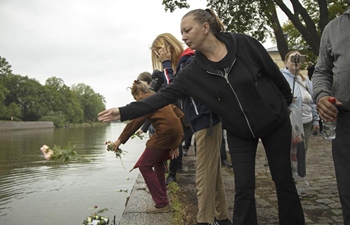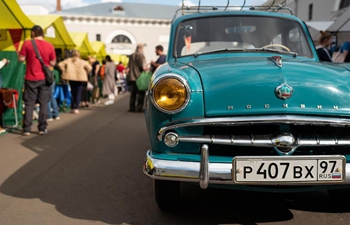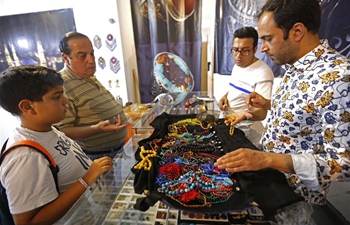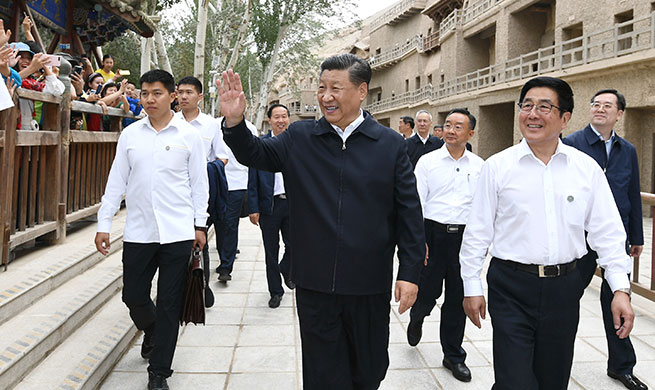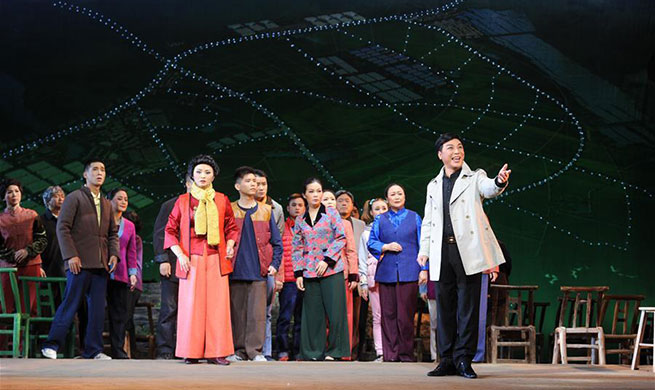TIANJIN, Aug. 19 (Xinhua) -- With the help of shop assistants, a white-haired senior put his feet inside a foot measuring device, which was about one meter high, with a flashing blue light.
The device is equipped with six scanners which can scan the sides and sole of each foot. Within a few seconds, the screen of the device will display a 3D model with the exact length, width, height and shape of the customer's feet.
"We can make tailored shoes for customers based on the 3D models," said Li Ying, director of the new retail department of Lao Mei Hua company, a time-honored shoe-making brand in northern China's Tianjin Municipality.
Founded in 1911, the company now attracts even more customers as it introduced more high-tech devices in its smart store, bringing new experiences to shoe-lovers.
In the smart store, customers can place orders on the "magic mirrors" by tapping the screen. The mirrors are intelligent shelves with detailed information of products displayed on the screens.
"My mother is accustomed to wearing their shoes, so I often come here to buy shoes," said a customer surnamed Li. She has bought a pair of black flats for her 75-year-old mother and was browsing through other shoe samples via the intelligent shelves.
When the camera fixed behind the mirrors senses people getting close, the intelligent shelf will narrow its interface to a small icon and becomes a mirror for the customers to try on shoes.
The entire smart store is covered with cameras equipped with an artificial intelligence system, which can recognize the gender, age, visit frequency and walking routes of the customers. By analyzing the routes, the system is able to figure out the most popular products in the store for the company's future marketing decisions.
While the high-tech dazzles the customers, the company also brings them closer to traditional shoe-making techniques using sounds of hammers, scissors and needles in the corner of the store.
Zhang Jianming, a 36-year-old shoemaker, wears a brown apron and sits behind a wooden workbench with vamps, soles and various tools on the table. He carefully pokes a small hole in a sole to allow the thick thread to pass through and finishes the soles with dense stitches.
The traditional shoe-making skill of Lao Mei Hua was listed as national intangible cultural heritage in 2011.
"Making shoes is a hard job. We need to endure long-time loneliness," said 62-year-old Sun Yukun, Zhang's teacher, who has been working in the industry for nearly five decades.
Sun added that no matter how advanced technologies have become, traditional shoe-making skills are still irreplaceable and need to be passed on from generation to generation.
"We won't lose our century-old shoe-making skills, but we need to keep up with the times as well," said Dong Jianshe, general manager of the company.
Since 2017, the company has organized activities for customers of all ages to learn about the traditional handicrafts, such as making circular fans and Chinese knots for free every weekend.
In the first half of 2019, the company sold about 270,000 pairs of shoes.
Zhang Baoyi, head of the Institute of Sociology under the Tianjin Academy of Social Sciences, said that inheritance is crucial for each time-honored brand, and they can also adopt high-tech to run better.
"It will maximize the value of such companies when they combine traditional techniques with the latest technologies," Zhang said.






